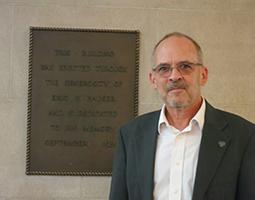William Condee, Reflections
Ohio University Professor William Condee is spending six weeks this spring semester researching and lecturing at Chubu University in Japan as the 41st Kohei Miura Visiting Professor.
Each year one OHIO faculty member travels to Japan to serve as the Kohei Miura Visiting Professor at Chubu University, and one Chubu University faculty member travels to Athens to serve as a Robert Glidden Visiting Professor. Condee, a professor of theater who also serves as OHIO's J. Richard Hamilton/Baker and Hostetler Professor of Humanities and as a Distinguished Professor, will be at Chubu from April 10-May 22.
Condee has taught at OHIO since 1986 and has long been interested in conducting research at Chubu University.
"I have heard often from President Charles Ping and many others about our strong relationship with Chubu University, their warm hospitality and the great opportunity to conduct research," Condee said. His research at Chubu will focus on studying the metaphysical aspects and ritual functions of Karukuri puppetry.
Karukuri is a traditional Japanese form of puppetry, and the region around Chubu University is known as the hub for the art form.
Condee is trained in Balinese shadow puppetry, which is also known as "Wayang Kulit" and has taught courses at OHIO in Southeastern Asia puppetry for the last 10 years. In addition, he has performed at temples in Bali as well as for other audiences on and off the OHIO campus. His background in Balinese shadow puppetry led him to his interest in this new research project.
"I am interested in exploring the same issues I have explored in Southeast Asia, the relationship of puppetry to local culture, in particular religion," Condee said. "Professors at Chubu University have been very generous in offering to help me conduct field research in Japan, including attending festivals where the puppets perform and interviewing the puppeteers, musicians and puppet makers."
In addition to doing the research work, Condee will also teach on the subjects of American drama and performance theory.
"I also hope to work with Chubu professors on issues of teaching and learning, as an extension of OHIO's Bruning Teaching Academy," Condee said. The Bruning Teaching Academy, which is part of OHIO's Office of Instructional Design, provides a developmental, peer-to-peer approach between faculty members for continuous improvement and implementation of evidence-based best practices.
Condee has taught and worked internationally previously, including at Leipzig University in Germany, the University of Wales and the University of Malaya in Malaysia. Those experiences have been important to him as a professor and he is confident that this time at Chubu University will also be invaluable.
"Teaching internationally has helped broaden my perspectives about what students are interested in and how they learn," Condee said. "For example, as part of my Fulbright award, I taught German high-school students in small villages near the Polish border as part of a program called 'Meet US.' We discussed issues of race in America, and I learned from them about connections to issues of immigration in Germany. While discussing shadow puppetry with students at the University of Malaya, I learned about connections to issues of gender, religion and race. Everything I have learned informs my teaching at Ohio University."
An award-winning faculty member, Condee is the author of two books, "Coal and Culture: the Opera House in Appalachia" and "Theatrical Space: A guide for Directors and Designers." He has also published more than 20 book chapters and articles and presented at more than 40 conferences around the world. He is honored to now be serving as this year's Kohei Miura Visiting Professor.
The Kohei Miura Visiting Professor Program, named in honor of the founder of Chubu University, provides funding for round-trip transportation, housing and a modest monthly reimbursement each year for an OHIO faculty member engaging in scholarly activities at Chubu University.
This article was provided by the Office of Global Affairs and International Studies.
